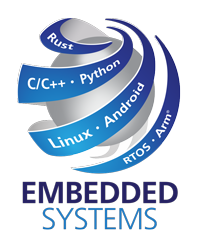Developing for embedded Linux
The tool-chain: choosing, installing and testing • Application program interfaces: the POSIX standard • Open source licenses: GPL/LGPL, BSD, etc
Debugging
Debugging a remote target device using gdb and gdbserver
Files and devices
Files and file-related API: waiting for several things to happen with select() and poll() • Devices: everything is a file. Interfacing with a simple device driver. Using the ioctl() function to access device-specific operations
Processes
Process life cycle: fork(), exit() and exec() • Scheduling: real-time and non-real-time policies; setting priority and niceness
Memory
Virtual memory and its consequences • Allocating from the heap and stack • Mapping memory using mmap
Signals
Standard and real-time signals • Writing robust signal handlers • Signal masks and how to handle signals synchronously
Real-time Linux kernels
Kernel preemption • The real-time PREEMPT_RT patch
Inter-process communication
Pipes • Shared memory and semaphores • Message queues • Sockets: internet and UNIX (local). Stream and datagram connections
POSIX Threads
Thread life cycle: pthread_create(), pthread_exit(), pthread_join() • Scheduling threads: real-time and non-real-time • The thread stack and how to set the stack size
Thread synchronisation
Synchronisation using mutexes; priority inversion and priority inheritance • Condition variables: producer and consumer threads • Thread cancellation and clean-up operators
Time and timers
• Timer accuracy: high-resolution timers, POSIX clocks and timers • Measuring time • Periodic tasks






